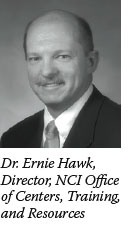
Guest Update by Dr. Ernie Hawk
TRWG Process Moving Forward, Members Named
 Since being named by Dr. von Eschenbach earlier this year to chair the Translational Research Working Group (TRWG), I have come to more fully appreciate the potential of the working group to influence how we approach translational research. We will evaluate the translational research components of the National Cancer Institute's (NCI's) current portfolio and provide a blueprint for how best to harness our translational research resources. Our goal is to ensure that the processes and programs are in place at NCI to rapidly translate the scientific discoveries of the cancer community's many dedicated scientists into new interventions for preventing, diagnosing, and treating cancer. Since being named by Dr. von Eschenbach earlier this year to chair the Translational Research Working Group (TRWG), I have come to more fully appreciate the potential of the working group to influence how we approach translational research. We will evaluate the translational research components of the National Cancer Institute's (NCI's) current portfolio and provide a blueprint for how best to harness our translational research resources. Our goal is to ensure that the processes and programs are in place at NCI to rapidly translate the scientific discoveries of the cancer community's many dedicated scientists into new interventions for preventing, diagnosing, and treating cancer.
There will be broad public input into the TRWG deliberations, including participation in the working group by many of the country's leading translational researchers, as well as representatives from the advocacy community, industry, the Food and Drug Administration (FDA), and NCI staff. In fact, the complete 60-member TRWG roster is
now available on the working group's Web site at www.cancer.gov/trwg.
In naming the members, I worked with the TRWG co-chairs, Drs. Lynn Matrisian and William G. Nelson, to select as representative a group as possible, while still ensuring it was of a manageable size.
Following in the mold of the Clinical Trials Working Group, TRWG will formulate recommendations for developing an optimized model for a translational research program, as well as an implementation plan for taking those recommended actions. The implementation plan is important because it will lay out the short-term changes to existing programs the working group believes are needed, as well as what new, longer term initiatives are required. Both the recommendations and the implementation plan will be presented to the National Cancer Advisory Board.
In December, TRWG will have its first planning meeting, which will be preceded by small-group teleconferences where members can engage in preliminary discussions about the issues that need to be addressed and potential models for a comprehensive translational research program.
The TRWG Web site will be an excellent resource for the cancer community to use for following and commenting on the TRWG process. After the December planning meeting, for example, specific questions about issues raised during the meeting will be posted to the Web site, and the public will be invited to submit comments on them.
In February, a larger roundtable meeting will be held involving the entire TRWG and an additional 140 participants, most of whom will be nominated by TRWG members. The February meeting should allow for a robust and fruitful discussion of the issues and potential models raised during the first planning meeting and public comment period.
I encourage those with an interest in the process to participate by submitting comments when materials are posted on the TRWG Web site. If you have questions about the TRWG, they can be submitted via the Web site as well.
I'm excited about TRWG and confident that the process for developing its recommendations and implementation plan will lead to important changes that, first and foremost, will benefit patients and move NCI and the cancer community closer to the 2015 goal.
|